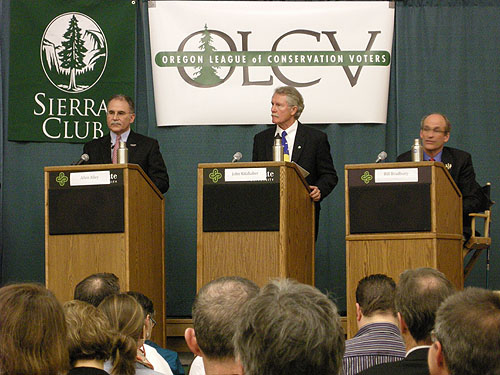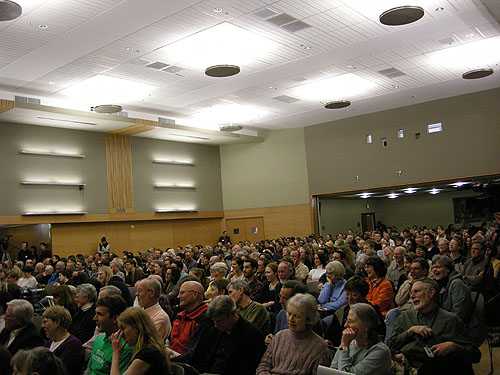It started out amicably enough. Between making jokes about their passion for steak and the absence of fellow candidate Chris Dudley, three gubernatorial hopefuls – Allen Alley, Bill Bradbury and John Kitzhaber – participated this week in a peaceful debate about environmental issues. But when Bradbury brought up the implications of a major campaign contribution Kitzhaber had accepted from an “egregious polluter,” Kitzhaber’s angry response quickly changed the mood.
The debate was held in front of several hundred people at Portland State University and hosted by Environment Oregon, the Oregon Environmental Council, the Oregon League of Conservation Voters and the Sierra Club’s Oregon chapter. Alley, Bradbury and Kitzhaber – or as another attendee nicknamed them to me, “the engineer,” “the college professor” and “the cowboy” – were invited to share their views on the state’s environmental issues and take stances on some of the more controversial topics. And while the Democratic candidates tended to be more or less in agreement about the importance of increasing green energy use and sustainable timber harvesting, Alley made it clear from the beginning that he had a different approach to tackling environmental issues. “I look at it from an economic perspective,” Alley said. “We’ve made trade-offs over the last 25 years between the environment and the economy. I have to focus on getting the economy going.”
Questions on transportation came up several times, with a good amount of time devoted to the merits of mass transit and alternative-energy vehicles. Transportation was brought up again when a panelist asked whether or not the candidates support the divisive, 12-lane Columbia River Crossing plan. Bradbury was adamantly opposed, which incited approving applause from the crowd. While acknowledging the huge transportation issues Oregon faces, particularly for moving freight across the Columbia River, Bradbury said he would support instead a seismic upgrade on the current bridge, the creation of a new smaller bridge for bikes and foot traffic, and the implementation of tolls to control congestion. “I think that is a very sensible future and won’t cost so much and spend all the transportation dollars that we have in this state,” Bradbury said. Kitzhaber said the project should go forward without delay, but that he doesn’t support the current plan, while Alley said he though the bridge should be bigger – before telling the visibly shocked crowd that we was joking.
BY KEVIN MANAHAN
It started out amicably enough. Between making jokes about their passion for steak and the absence of fellow candidate Chris Dudley, three gubernatorial hopefuls – Allen Alley, Bill Bradbury and John Kitzhaber – participated this week in a peaceful debate about environmental issues. But when Bradbury brought up the implications of a major campaign contribution Kitzhaber had accepted from an “egregious polluter,” Kitzhaber’s angry response quickly changed the mood.
The debate was held in front of several hundred people at Portland State University and hosted by Environment Oregon, the Oregon Environmental Council, the Oregon League of Conservation Voters and the Sierra Club’s Oregon chapter. Alley, Bradbury and Kitzhaber – or as another attendee nicknamed them to me, “the engineer,” “the college professor” and “the cowboy” – were invited to share their views on the state’s environmental issues and take stances on some of the more controversial topics. And while the Democratic candidates tended to be more or less in agreement about the importance of increasing green energy use and sustainable timber harvesting, Alley made it clear from the beginning that he had a different approach to tackling environmental issues. “I look at it from an economic perspective,” Alley said. “We’ve made trade-offs over the last 25 years between the environment and the economy. I have to focus on getting the economy going.”

Questions on transportation came up several times, with a good amount of time devoted to the merits of mass transit and alternative-energy vehicles. Transportation was brought up again when a panelist asked whether or not the candidates support the divisive, 12-lane Columbia River Crossing plan. Bradbury was adamantly opposed, which incited approving applause from the crowd. While acknowledging the huge transportation issues Oregon faces, particularly for moving freight across the Columbia River, Bradbury said he would support instead a seismic upgrade on the current bridge, the creation of a new smaller bridge for bikes and foot traffic, and the implementation of tolls to control congestion. “I think that is a very sensible future and won’t cost so much and spend all the transportation dollars that we have in this state,” Bradbury said. Kitzhaber said the project should go forward without delay, but that he doesn’t support the current plan, while Alley said he though the bridge should be bigger – before telling the visibly shocked crowd that we was joking.
The closure of Portland General Electric’s Boardman coal plant was another hot topic at the debate; Bradbury quickly said he would shut it down in 2014 when the license for the controversial plant is up for renewal, while Kitzhaber cautioned about closing the plant too soon before its current 2020 deadline because of the economic hardships it would initially create for industries and residents who rely on its energy. But to Alley, trying to push a timeline forces innovation, which could end up being costly to Oregon, so he said would not try to close the plant earlier. “I am incredibly confident that we will solve all these issues,” Alley said. “All of the solutions exist to do that. There are environmental footprints involved with every single one of them, and nothing comes for free, but I would not try to jerk this around to try to close it earlier. I believe the decision is up to [the plant].”
Alley was again in the minority when it came to his views on liquefied natural gas terminals and stated his support of the proposed terminals in Coos Bay and Astoria. Kitzhaber had a more cautious opinion, naming natural gas as the best “transition fuel” to move toward carbon-free energy but wanting to make sure there were sufficient sources without LNG. “I oppose the LNG plans for environmental reasons and also because we don’t need it as part of the transition fuel, but I wouldn’t slam any doors at this point,” Kitzhaber said. Bradbury stood firm in his opposition (as he has been since being the first elected official to oppose terminals on Oregon’s coast). “There’s a real simple reason for it: Liquefied natural gas is 25% dirtier than the natural gas we currently get from the Rockies or from Canada,” Bradbury said. “It doesn’t make sense to extend our fossil fuel dependency by putting our whole energy future in these huge tankers that come from other places instead of developing the incredible energy resources we have here.”

But differences aside, the debate seemed more like a friendly discussion, particularly between the two Democrats, until the segment of the debate that allowed the candidates to pose questions for each other. After a series of softball questions, Bradbury asked why Kitzhaber accepted a $10,000 contribution from Cascade General (a company that has come under fire from the Environmental Protection Agency over the years) and challenged the former governor to both return the contribution and not take any more money from big polluters.
In addition to saying he would not return the money, Kitzhaber fired back: “If you are somehow implying that a campaign contribution to me means that I am somebody’s pocket, I am insulted, incensed and extraordinarily disappointed in you.” The debate may have been focused on the environment, but judging by the buzz in the room following the tiff, it looks like good old political warfare is still what gets people talking.



